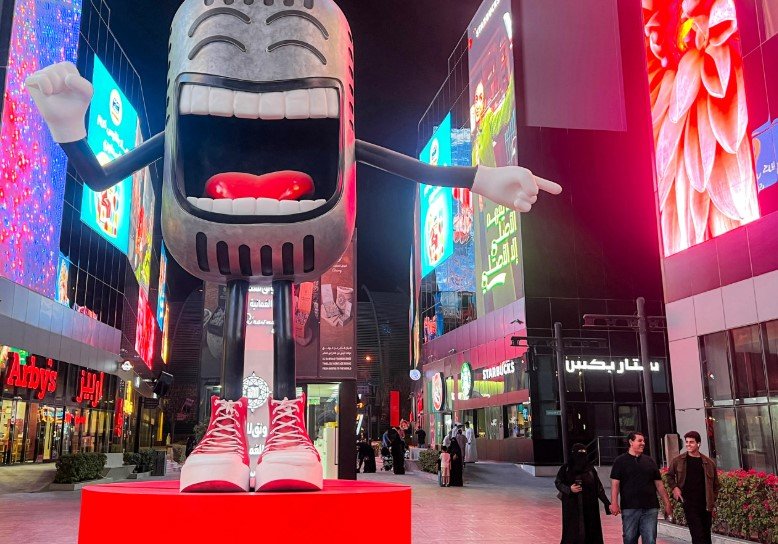The Riyadh Comedy Festival in Saudi Arabia drew massive backlash this month as over 50 top comedians, including Dave Chappelle and Kevin Hart, performed under strict rules that banned jokes about the royal family, religion, or the government. Held from September 26 to October 9, 2025, the event highlighted tensions between free speech and human rights concerns in the kingdom, with critics accusing participants of ignoring Saudi Arabia’s record of jailing activists and restricting dissent.
Festival Lineup and High Pay Draw Scrutiny
More than 50 A-list comedians took the stage at the Riyadh Comedy Festival, turning Boulevard City into a hub for laughs amid luxury settings. Stars like Bill Burr, Pete Davidson, Louis CK, and Aziz Ansari joined the roster, reportedly earning large sums for their appearances. Some estimates suggest payments reached up to $1 million per performer, based on public disclosures from comics like Tim Dillon.
The event aimed to boost Saudi Arabia’s image as a modern entertainment destination, part of broader efforts under Vision 2030 to diversify the economy beyond oil. Yet, the high payouts raised eyebrows, especially when paired with the kingdom’s ongoing human rights issues. Comedians who declined invitations, such as Shane Gillis and Atsuko Okatsuka, pointed to these concerns as their reason for saying no.
Public sentiment on social media reflected mixed views. While some praised the festival for bringing global talent to the region, others condemned it as a tool for image laundering by the Saudi government.

Strict Rules Limit Jokes and Free Speech
Contracts for performers included clear restrictions to avoid offending Saudi authorities. Participants agreed not to ridicule the royal family, the legal system, any religion, or the kingdom itself. These rules stemmed from Saudi laws that criminalize speech challenging the king or crown prince, with penalties including imprisonment.
For instance, two comedians were removed from the lineup after podcast comments that touched on human rights abuses. Jim Jefferies lost his spot for joking about a reporter’s death, and Tim Dillon was dropped for a sarcastic remark about overlooking slavery allegations. Such enforcement showed how tightly the General Entertainment Authority controlled the content.
These limits sparked debates about comedy’s role in society. Experts note that humor often challenges power, but in this case, it seemed muted to fit local norms. Recent events, like the 2018 killing of journalist Jamal Khashoggi, added context to why many saw the rules as part of a larger pattern of censorship.
- No derogatory material about the Saudi royal family or government.
- Bans on ridiculing any religion or religious figures.
- Prohibitions against content that could embarrass the kingdom.
Human Rights Groups Push Back
Human Rights Watch took a firm stand against the festival by refusing donations from participating comedians. When Aziz Ansari offered part of his fee to support free press causes, the group declined, urging performers instead to call for the release of Saudi prisoners of conscience. This move highlighted the festival’s ties to broader repression in the country.
Saudi Arabia has faced global criticism for detaining activists, including women’s rights advocates and critics of the regime. According to reports from Amnesty International, thousands remain imprisoned for peaceful expression. The festival’s timing, near the anniversary of Khashoggi’s murder, fueled accusations that it distracted from these issues.
Other comedians voiced disapproval. Marc Maron publicly rebuked peers for joining, calling it a way to obscure abuses. David Cross issued a statement expressing disgust, comparing it to performing under oppressive regimes in history.
In a related free speech case, a man in Tunisia, initially sentenced to death for criticizing the president, received a pardon this week. This event underscores global challenges to expression, much like the Saudi restrictions.
Impact on Comedy and Global Image
The backlash has rippled through the comedy world, with some fans boycotting performers involved. Podcasts and social media buzzed with discussions, as seen in posts where users questioned the ethics of accepting Saudi money. This controversy mirrors past debates, such as athletes competing in events sponsored by regimes with poor human rights records.
For Saudi Arabia, the festival fits into a pattern of hosting major events like sports tournaments to improve its international standing. However, critics argue these efforts often mask underlying problems without leading to real reforms.
Looking ahead, similar festivals might face more scrutiny. Comedians could weigh the financial gains against reputational risks, especially as audiences demand accountability.
| Key Comedians Involved | Reported Actions or Statements |
|---|---|
| Dave Chappelle | Performed despite backlash; joked about easier speech in Saudi than America. |
| Kevin Hart | Joined lineup; no public comment on restrictions. |
| Aziz Ansari | Defended participation; offered donation refused by Human Rights Watch. |
| Bill Burr | Took part; faced criticism from peers like Marc Maron. |
| Pete Davidson | Performed; event promoted as luxury entertainment. |
Broader Lessons for Free Expression
Events like the Riyadh Comedy Festival raise questions about balancing cultural exchange with ethical concerns. While it brought joy to local audiences, it also spotlighted the limits of free speech in authoritarian settings. In 2025, with rising global tensions over expression, such stories remind us of the ongoing fight for open dialogue.
As debates continue, readers can stay informed by following updates on international comedy and human rights. Share your thoughts in the comments below or spread this article to spark conversations among friends.
